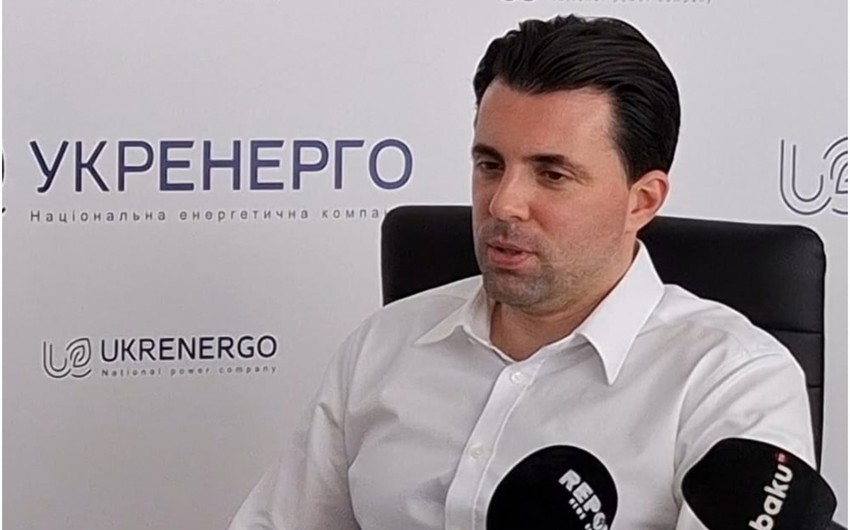In an interview with Report, Volodymyr Kudrytskyi, Chairman of the Management Board of the Ukrainian National Power Company Ukrenergo stated that Ukraine is observing a serious energy crisis countrywide as a result of the recent mass airstrikes by Russia on energy infrastructure. There are interruptions in the energy supply for the population.
- What kind of problems has Ukraine's energy infrastructure faced after the recent rocket strikes?
- In winter of 2022-2023, the enemy army began to attack the facilities of Ukrenergo. We are a company that provides 40% of the country's energy needs. Furthermore, more than half of the main grid, and almost all thermal and hydroelectric power plants in the country were damaged. Ukrenergo was able to restore substations and distribution nodes in the network, and partially restore power plants damaged in the winter of 2022-2023. Russia is currently attacking power plants and substations with Shahed and suicide drones. The transmission network of Ukrenergo works stably and can transmit the required amount of electricity to any region. But we have big problems with electricity generation. As the President of Ukraine stated, we have lost more than nine gigawatts in power production, which is quite a large number. This is enough power to meet the electricity needs of Hungary or Slovakia and the Baltic countries together. Therefore, we currently face a significant deficit, and as system operators, we need to establish schedules for temporarily disconnecting consumers from the network. The high consumption rate exacerbates the primary issue, which is the insufficient production.
- What was the extent of energy infrastructure damage caused by the attacks? Which regions were most affected by the attacks?
- Ukrenergo transmission network has no problems and is able to transport any amount of electricity. The largest attacks were in Odesa, Kharkiv, Kyiv, Zaporizhzhia, Mykolaiv, as well as Sumy and Lviv. Currently, Ukrenergo’s substations are operating normally in the regions. In general, the electricity generation is much less than the consumption. Currently, there is a lack of power plants.
- What steps are taken to get out of the situation as the winter demand draws near?
- We will have problems with electricity generation. That is, there is not enough power generation capacity. Some of the nine gigawatts we had lost will be restored, but unfortunately not all. We will probably have to deal with power cuts in the winter. We constantly use electricity imported from Europe. Ukraine's grid is connected to Europe. We disconnected from the Russian energy system four hours before the attack on our country. But imports from Europe will not be able to fully cover the deficit and there will most likely be blackouts in the winter.
- What is the level of cooperation with Azerbaijan?
- The history of our relations with Azerbaijani companies goes back long before the Russian aggression against Ukraine. Long before the war, Ukrenergo cooperated with various companies, especially Azerbaijan’s AZENCO OJSC, on the supply of various kinds of equipment, including, transformers and electrical equipment. We have cooperated with AZENCO witin international projects. That’s why, Azerbaijani companies and businesses are long-standing partners for us.
After Russia’s large-scale attack on Ukraine, Azerbaijan provided substantial humanitarian aid to restore electricity supply to the population, particularly during the challenging winter of 2022-2023.
It was a difficult period for Ukraine, and the Azerbaijani government and companies supported the Ukrainian people. We are very grateful to Azerbaijan for that. After our victory, the Ukrainian market will be the largest reconstruction market on the continent for decades. Electrical equipment, materials, and equipment for factories and other companies will appear here. We hope that Azerbaijan will participate in Ukraine’s energy sector and will be an active participant in the restoration of its energy infrastructure. We’re talking about both traditional electricity generation, grids, substations, and renewable energy sources. I am sure that Azerbaijan will be in the Ukrainian market. You know, both in Ukraine and in Azerbaijan, there are quite unique production facilities, such as the production of autotransformer equipment. The expansion of green energy usage in Europe necessitates significant investments in network infrastructure. Countries with advanced manufacturing technologies, including high-voltage autotransformers, hold a significant advantage. In my view, collaboration in this field would be highly interesting for our companies.
- What are the innovations in the air defense of energy infrastructures? What is the state of Ukraine's occupied Zaporizhzhia NPP?
The air defense systems are in high demand. Their sufficiency hinges on the quantity and quality of air defense equipment received from our Western partners, including both launchers and missiles. Undoubtedly, the presence of air defense systems is the first and main factor for the survival of the Ukrainian energy industry. The outcome will significantly depend on how the rockets and launchers are delivered.
As for the Zaporizhzhia NPP, it is currently under occupation. By supplying electricity to the NPP, we ensure its safety. However, it’s important to note that the NPP no longer generates electricity; instead, it consumes electricity as a facility. The plant uses electricity to cool stored nuclear fuel. Nuclear fuel constantly emits heat, so it needs to be constantly cooled to prevent any nuclear incidents. As a result of enemy fire, the two lines connecting the NPP with the Ukrainian grid were cut and the power plant was in an isolated mode.
After the power grid disconnection at the NPP, emergency backup diesel generators were activated. This scenario mirrors the situation before the Fukushima accident and poses a significant danger. Such occurrences were frequently observed during the initial stages of Russian aggression.
When the NPP was captured by the Russian occupation forces, there were even attacks on the power units of the NPP with tanks. In the 21st century, these actions, especially following the Chernobyl disaster, defy imagination.


 https://static.report.az/photo/42ce5941-e939-3a9b-b7ff-1ef16f5986c0.jpg
https://static.report.az/photo/42ce5941-e939-3a9b-b7ff-1ef16f5986c0.jpg

